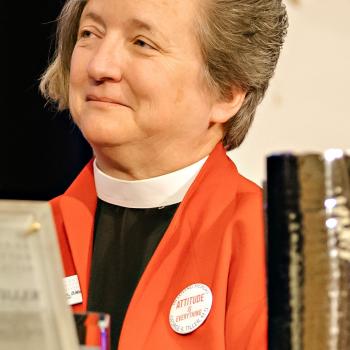I have conservative Evangelical friends who reject the radical Protestantism of the Episcopalians and mainstream Lutherans etc. with their homosexualist and feminist agenda. “They have nothing to do with us!” they cry. “We conservative Evangelicals are the true Protestants. We are faithful to the Bible. We will never change. We preach ‘the faith once delivered to the saints.'” And so forth. But is this true, or are the conservative Evangelicals also enthusiastic about the homosexualist and feminist agenda?
I don’t see them lining up to endorse same sex marriage, but what about their views on the feminism? Let’s see what is happening at Zondervan–the largest Evangelical publishing house. They are the sole publishers of the very popular Evangelical Protestant translation of the Bible–the New International Version. This version of the Bible holds about 50% of the market share of new Bible sales. Back in 1997 they said they were going to produce a ‘gender free’ version of the NIV, but then backed down after their conservative Evangelical audience put up a big stink. But they’re back at it again, and the Today’s New International Version (TNIV) is going to be published.
Their aim is to ‘correct the masculine bias’ of the Scriptural text. Terms like ‘Father’, ‘Brother’ will be changed to ‘Parent’ and ‘fellow believer’ or ‘brother or sister’. ‘Men’ will be changed to ‘humans’ etc. You know the schtick. It’s everywhere now. So why does it matter? To read an excellent critique go here. The author makes a very good case, with numerous examples to show how changing the ‘gender bias’ in the Scriptures is not only unfaithful to the original languages, but subtly transforms the theology and the nature of the divine relationship with the human race.
There are a couple of things that interest me about this bit of news. First of all, I find it odd that the Protestants regularly blame Catholics for ‘adding things to Scripture’ or ‘adding extra books to the Bible’, while Protestants have been at it since the beginning. It started with the Protestants removing the apocryphal books from the Bible, Martin Luther wishing to cut the epistle of James and the Book of Revelation etc, and adding ‘faith alone’ to his his version of Romans 5:1 in order to make Scripture support his theology. Now we have the Protestants (who are so fervent in their sola Scriptura beliefs and so fervent in their love for the Scriptures) tinkering with the eternal word of God for politically correct motives. Nothing new there then.
Secondly, Zondervan’s willingness to adjust the Scriptures so that they more suitably reflect the political and social views of wealthy Western Christians shows that they are firmly in the ‘relative’ not the ‘revealed’ side of the debate on Christian identity. Is the Christian faith revealed by God and unchanging at its core, or is it a human construct built up from the spiritual longings of human beings in particular cultures and circumstances? It would seem this brand of conservative Evangelicals–if happy to adjust the Scriptures which they should regard as sacrosanct–falls into the ‘relative religion’ camp rather than the ‘revealed religion’ camp.
There is a more subtle point to be considered here. Does the faith remain unchanging in every detail in every cultural situation and in every age? No. Things do change and must change. Otherwise the faith ossifies in only one cultural and contemporary expression. The question is not whether the practice and expression of the faith should change, but how much it changes, and more importantly–what are the principles on how it changes? What are the criteria for proper development of the faith? Bl. John Henry Newman’s study of the Development of Doctrine gives the best guidelines for how the faith may change and develop. Simply put, it develops in continuity with what has gone before. There is a ‘hermeneutic of continuity’, and this is combined with the magisterium of the church–which guides the development in an authentic way.
Without this idea of a ‘hermeneutic of continuity’, and without the magisterium of an agreed external authority, the Evangelicals who want to alter the Bible to be gender free are standing on the same philosophical shifting sands as the radical liberals they so despise. The Protestant religion wars in the United States have the ‘conservatives’ standing against all the radical liberal agenda, and yet philosophically they are on the same relativistic ground. They both hold to two of the same foundation principles which are mutually contradictory. 1. sola Scriptura – the Bible is the sole (or at least ultimate) source of authority 2. Private interpretation – you can make the Bible say whatever you want it to say.
Both the radical Protestants and the conservative Protestants believe the Bible is the ultimate authority, and both of them make the Scriptures say whatever they want them to say. The two parties come up with totally different conclusions. They are opposed utterly, but the philosophical foundation on which they stand is the same.
Both believe the Bible is the authority and both believe it is okay to translate the Bible (and add ‘study’ notes) to make sure it is interpreted the way they wish. This means they are in constant battles, “The Bible says this. No it doesn’t it says this. Yes but it doesn’t really mean that it means this. That’s what you say, but I say it doesn’t really mean that it means this.”
Without an external agreed authority to determine how the Bible is interpreted and how the faith may properly develop what else can they do?











